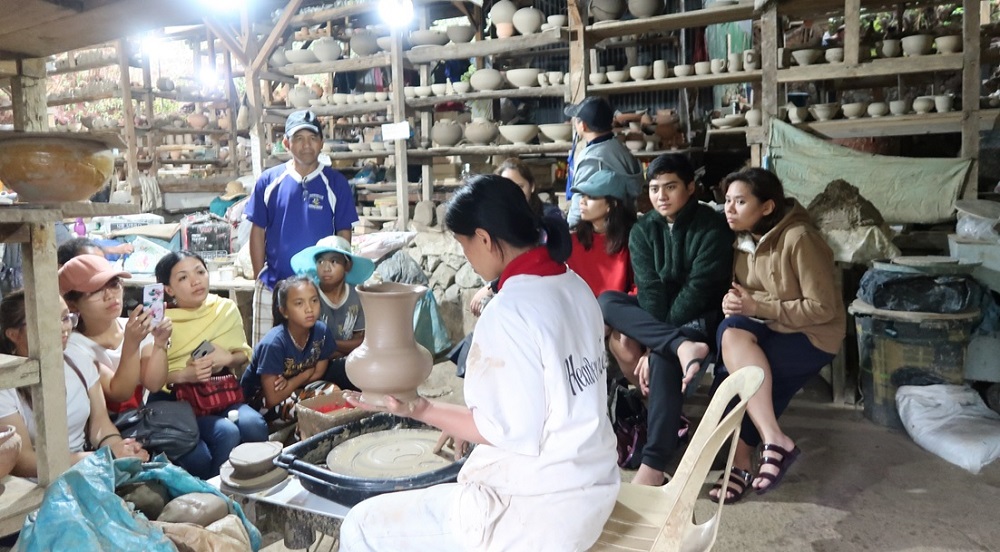
March 04, 2021 Thursday

Ms. Siegrid Bangyay, a ceramic artist from Sagada, Mountain Province demonstrated how to make pots and ceramics. Photo from the Powerpoint presentation of Ms. Bangyay.
MANILA, 5 March 2021 — Ceramicists and brickmakers call for more capacity-building initiatives to enrich culture-based livelihoods in the 36th episode of “Stories for a Better Normal: Pandemic and Climate Pathways,” hosted by three-term Senator, now House Deputy Speaker and Antique Representative Loren Legarda.
The second part of the resilient livelihoods episode with the topic, “Pottery: Continuity and Change” gathered potters, brickmakers, and representatives from the government and academe and showcased various traditional crafts and masterpieces made of clay from the different regions in the Philippines.
Sheryl Ebon-Martinez, a ceramicist from Oryoqi Handmade Pottery; Siegrid Bangyay, a ceramic artist from Sagada, Mountain Province; Alvin Obrique, a pottery maker from Sibalom, Antique; and Anacleto Amar, a brickmaker from Tibiao, Antique; Nelia Elisa Florendo, chief of Industrial Technology Development Institute of the Department of Science and Technology; Rosaly Jean Resolute, Business Counselor from Negosyo Center of the Department of Trade and Industry; and Elsie Marie Carloto, a ceramic teacher and researcher at the University of Antique were this episode’s guests.
“In this era of climate change, apektado ang ating mga trabaho sa probinsya, sa rural areas, sa kanayunan...And we are going back to basics, using the wealth of our soil and our land sustainably for resilient rural livelihoods,” said Legarda.
The guest ceramicists showed and demonstrated their creations and products such as terracotta bricks, huge and complex ornamental jars, mini cooking sets, flower pots, and others.
"Noong 2018 o 2019, nagre-rent lang ako ng kiln noong time na ‘yon, then it made me realize na this is something that I can do in the long-term. And in January 2020, I had a kiln built in my house in Quezon City. Then nagkaroon ng pandemic, we couldn’t go out, we couldn’t go anywhere, so I spent a lot of time practicing and making teawares. It was both a blessing and challenging, pero yung time na naka lockdown ako, it made me a lot of leeway to experiment and to get all the creative ideas into the stuff that I was making," said Sheryl Ebon-Martinez.
"In order to get the right quality of clay, there’s a lot of processes and a lot of people involved in order to finish a product. Also, there’s a lot of collaboration with other local people with my products, because I incorporate local designs and I work with rattan weavers here in order to get that right quality of material that we need," said Siegrid Bangyay.
“Noong nakita ng Resource Management Program na ang lupa ay maganda pala na gawing earthenware, nag-umpisa nang ma-enhance ‘yung pottery at bricks making projects. May naging tulong din ang local government unit at ang Department of Trade and Industry regarding sa pagpapaganda ng mga [produkto] namin,” said Anacleto Amar.
"May ginawa kaming training noong December, nag-train kami ng molding gamit ang plaster of paris at nakagawa ng bricks dahil sa tulong na brick molder, nakapag produce din kami ng maraming pots dahil sa jiggering machine. Noon, gumagawa lang kami ng clay pots na manu-mano at tinatapakan, ngayon malaking tulong ang machines dahil hindi na namin kailangan mag-exert ng effort, kaya napapadali ang paggawa namin," said Alvin Obrique.
Meanwhile, the representatives from the government underscored the importance of protecting and preserving culture-based livelihoods which not only provide income to the local communities, but also preserve the cultural heritage of the country.
“Ang purpose ng DTI ay makatulong sa pag-increase ng income ng ating mga pottery at brickmakers, at ma-improve natin ang quality ng kanilang mga produkto,” said Rosaly Jean Resolute.
"In the early 80s, we even proceeded with our research and development on ceramic whiteware production. Kasi nag-boom ang industries late 80s towards the 90s, kung saan nag-eexport tayo ng ceramic whitewares natin. But unfortunately, yung competition in terms of cost, doon tayo medyo nahirapan and it leaves us with one opportunity, yung ating terracotta industry. Dahil nandito yung strength natin because we have a lot of red clay and of course lalo pa nating napatunayan ngayon ang dami nating skilled workers and entrepreneurs, who are into ceramics," said Nelia Elisa Florendo.
"Ang mga faculty and staff ng University of Antique ang nate-train po at marami kaming ginagawa na mga sari-saring pots gamit ang jiggering. Sa ngayon, ini-enhance pa rin namin ang mga skills ng mga potters in line sa mga techniques in design sa pottery production," said Elsie Marie Carloto.
As a long time advocate of cultural heritage and Micro, Small, and Medium Enterprises (MSMEs), Legarda emphasized the need to capacitate MSMEs, including culture-based livelihoods, as part of the overall strategy on economic development, providing opportunities for support and growth, and ensuring that their special needs are addressed.
“Let's reach out to as many barangays and communities as possible lalo na yung mga walang trabaho para ma-train para gumawa ng pottery. Let's improve the designs and tumulong tayo sa marketing through online selling and exhibits,” said Legarda.
“Inclusivity – this means our role is to help uplift the lives of all our people. So we must bring the technology to provinces and academe to embed it in barangays so that even the poorest can have access and be empowered for their micro-enterprises,” Legarda concluded.
As an online discussion to promote health, environmental consciousness, and climate-adaptive practices, "Stories for a Better Normal" aims to change the mindset of individuals, families, and communities by demonstrating ways in which a ‘better normal’ can be realized within our communities.
This online discussion is organized in partnership between the Office of Deputy Speaker Legarda and the Climate Change Commission, with support from the Department of Education, Philippine Information Agency, Institute for Climate and Sustainable Cities, The Climate Reality Project-Philippines and Mother Earth Foundation.